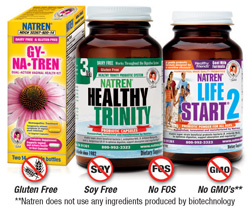

Gas (or flatulence) is a normal part of the digestive process, and everyone expels intestinal gas periodically around the clock. The daily average that a person with a normally functioning digestive system passes gas is seven times for women, and twelve times for men. The flatulence only becomes a problem when it is excessive, extremely smelly, or uncomfortable.
CAUSES OF EXCESSIVE GASSome gas comes from swallowing air when eating, drinking, smoking or chewing gum, but most gas is generated in our intestinal tract during the process of digestion. Most of the digestion of food and the absorption of nutrients begin in the small intestine. If the food moves too rapidly from the small intestine to the large intestine, some fiber and carbohydrates will reach the large intestine undigested. The hundreds of different species of live bacteria that live in the large intestine go to work breaking down this undigested starch and fiber. The process in which helpful bacteria in the large intestine aid in digesting food is known as "fermentation". Fermentation can cause large quantities of gas.
Large meals and meals high in fiber and carbohydrates tend to produce more gas. Compounds in some foods cause intestinal gas in some people - commonly beans, cabbage, broccoli, Brussels sprouts, turnip and onion and garlic, but also some fruits. Foods that produce gas in one person may not produce gas in another. Food allergies and sensitivities (such as lactose intolerance or a gluten sensitivity) are a common cause of excessive gas in some people.
Carbonated beverages such as soda or beer can cause excessive gas, as can sugar-free candies and gums that contain sugar alcohols such as sorbitol, mannitol, and xylitol. There have been many anecdotal reports1 of people experiencing "gas attacks" after ingesting the artificial sweetener Splenda. An animal study released by "The Journal of Toxicology and Environmental Health"2 in January of 2008 reported that Splenda (sucralose, an indigestible sugar) may alter the composition of the natural intestinal microflora ("good bacteria") known to assist digestion.
Some people produce more intestinal gas when they are stressed or tense. Another cause of excessive gas in women is the hormone progesterone. The flatulence may |
also increase if you are on antibiotics, as they can reduce the beneficial bacteria that normally help your body process gas in the intestine. More and more health care professionals are recommending probiotic supplements to patients who are taking antibiotics to help support a steady supply of "good bacteria" for relief from minor occasional gas and irregularity.
GAS REMEDIESEating smaller meals, eating slowly, avoiding "trigger foods", quitting smoking, stress reduction, and exercising to move gas through the digestive tract can all help combat excessive gas and flatulence. Avoid chewing gum and drinking through a straw. The esteemed Mayo Clinic suggests taking probiotics3 to help your body digest lactose.
"More and more health care professionals are recommending probiotic supplements to patients who are taking antibiotics to help support a steady supply of "good bacteria" for relief from minor occasional gas and irregularity."
Probiotics can aid digestion by supporting:
AVOID THE
|
Most inulin or fructooligosaccharide is either synthesized from sucrose or extracted from chicory. Some types of FOS are derived from cane or beet sugar. Fructooligosaccharide can also be manufactured through chemical synthesis, using a fungal enzyme to convert cane or beet sugar into FOS. Historically, FOS was used as a sugar substitute in Japan. Animal studies point to the possibility that a supplement that contains a sugar derivative could feed the growth of sugar loving "bad bacteria", counteracting any probiotic benefits the supplements might provide.4, 5
PREBIOTIC SIDE EFFECTS
|
||||||||

